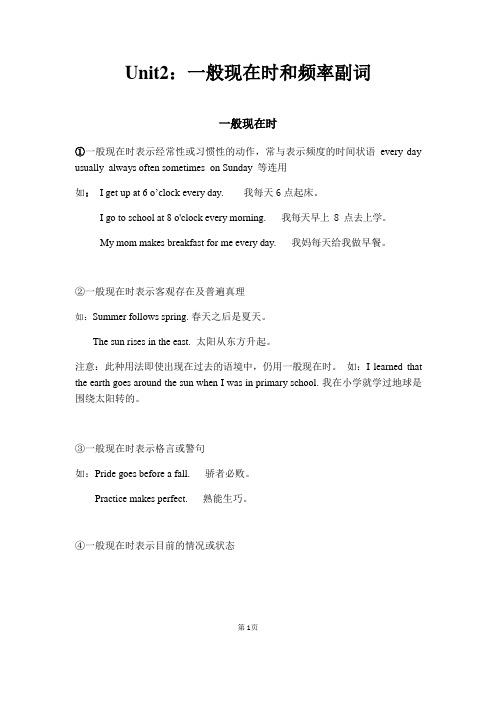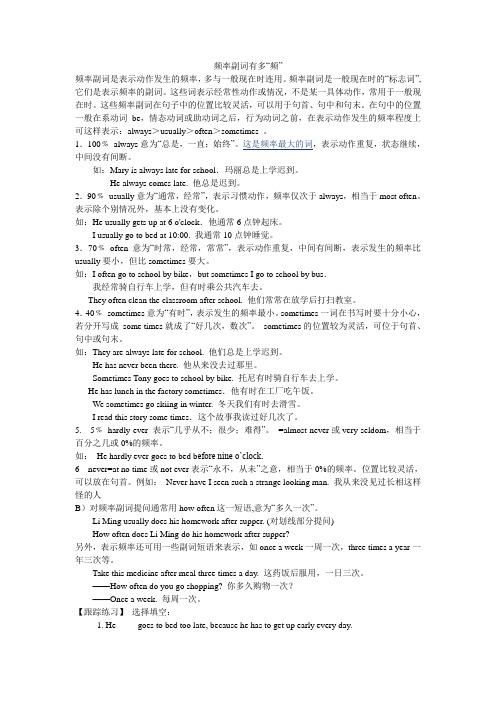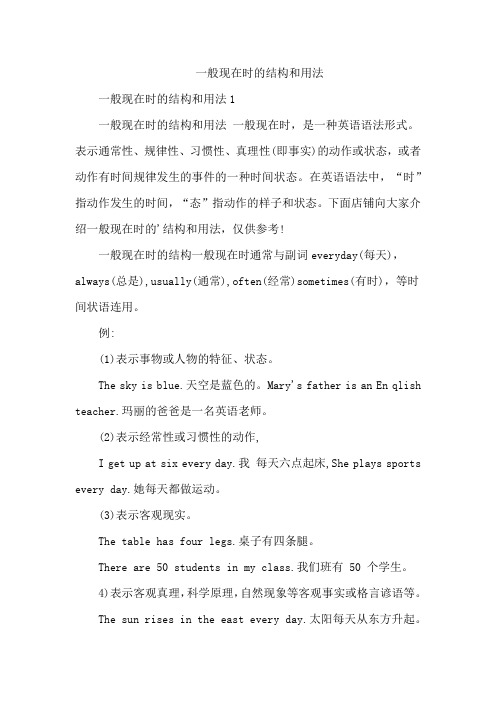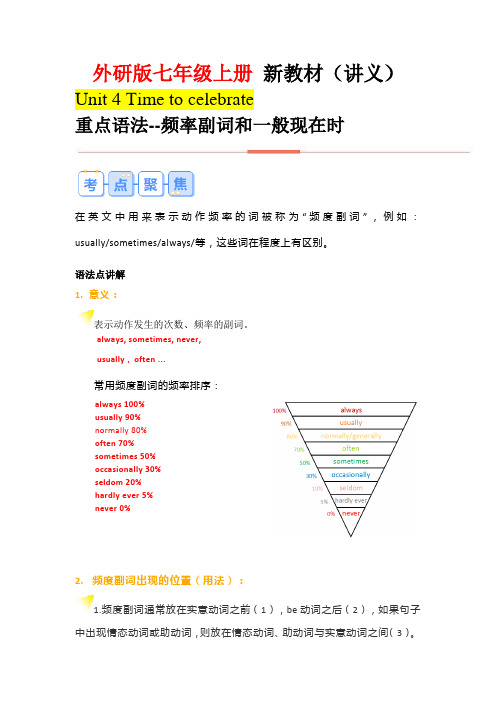一般现在时与频率副词
英语七年级英语上册Unit-2-语法-一般现在时和频率副词讲义牛津深圳版

Unit2:一般现在时和频率副词一般现在时①一般现在时表示经常性或习惯性的动作,常与表示频度的时间状语every day usually always often sometimes on Sunday 等连用如:I get up at 6 o’clock every day. 我每天6 点起床。
I go to school at 8 o'clock every morning. 我每天早上 8 点去上学。
My mom makes breakfast for me every day. 我妈每天给我做早餐。
②一般现在时表示客观存在及普遍真理如:Summer follows spring. 春天之后是夏天。
The sun rises in the east. 太阳从东方升起。
注意:此种用法即使出现在过去的语境中,仍用一般现在时。
如:I learned that the earth goes around the sun when I was in primary school. 我在小学就学过地球是围绕太阳转的。
③一般现在时表示格言或警句如:Pride goes before a fall. 骄者必败。
Practice makes perfect. 熟能生巧。
④一般现在时表示目前的情况或状态第1页如:I am a teacher. 我是教师。
You are a student. 你是学生。
以here, there 等开始的倒装句,表示动作正在进行。
如:Here comes the bus. = The bus is coming. 车来了。
There goes the bell. = The bell is ringing. 铃响了。
一般现在时的构成①be 动词:主语+ be (am, is, are) + 其它。
如:I am a boy. 我是一个男孩。
You are a girl. 你是一个女孩。
四大语法总结

语法总结及其比较Ⅰ:一般现在时:一:Meaning (涵义)表示经常性习惯性的动作,存在的状态或者表示客观事实或者真理。
经常与表示频率的副词连用。
二:一般现在时的标志词(频率副词):every day(month / year)always>usually>often( frequently)>sometimes>seldom(rarely)很少>never ★频率副词是一般现在时的标志词,位置有两个基本和一个特殊:(1):放在be后I am usually at home.(2):放在主语后实意动词前(主后动前)I always go to school at 7o’clock.(3):sometimes还可以放在句首或句尾:Sometimes I am late for school.I am sometimes late for school.I am late for school sometimes.三:Basic Structures (基本结构)小提醒:1:在学习一般现在时时分成两大块来记,be动词的一般现在时和实义动词的一般现在时,记住be动词和实义动词原形不能同时并列出现。
2:be动词包括(am / is /are)I am / you (we/they) are / he(she,it/单数名词)is3:实义动词就是指表示具体动作的词语,C: 第三人称单数形式的变化:动词的第三人称单数形式,是在一般现在时中当主语是he/she/it/单个的人名或者事物时后面有实义动词,实义动词要用第三人称单数形式。
主语若是I/you/we/they或复数名词,肯定动词用原形,否定疑问do来帮忙。
疑问把do提前去,do问do答否定do后加not,don’t放在主后动前。
主语若是he/she/it或单个人名肯定动后用三单,否定疑问does来帮忙否定does后加not,简写为doesn’t,放在主后动前疑问does提前去,does问does答,特殊疑问就在疑问句前加疑问词what什么how怎样where哪里when何时Ⅱ一般过去时一:一般过去时的涵义:一般过去时表示在过去的时间里发生的动作(实意动词)或者存在的状态(be动词),动作结束。
频率副词有多‘频‘

频率副词有多“频”频率副词是表示动作发生的频率,多与一般现在时连用。
频率副词是一般现在时的“标志词”,它们是表示频率的副词。
这些词表示经常性动作或情况,不是某一具体动作,常用于一般现在时。
这些频率副词在句子中的位置比较灵活,可以用于句首、句中和句末。
在句中的位置一般在系动词be,情态动词或助动词之后,行为动词之前,在表示动作发生的频率程度上可这样表示:always>usually>often>sometimes 。
1.100﹪always意为“总是,一直;始终”。
这是频率最大的词,表示动作重复,状态继续,中间没有间断。
如:Mary is always late for school.玛丽总是上学迟到。
He always comes late. 他总是迟到。
2.90﹪usually意为“通常,经常”,表示习惯动作,频率仅次于always,相当于most often。
表示除个别情况外,基本上没有变化。
如:He usually gets up at 6 o'clock.他通常6点钟起床。
I usually go to bed at 10:00. 我通常10点钟睡觉。
3.70﹪often意为“时常,经常,常常”,表示动作重复,中间有间断,表示发生的频率比usually要小,但比sometimes要大。
如:I often go to school by bike,but sometimes I go to school by bus.我经常骑自行车上学,但有时乘公共汽车去。
They often clean the classroom after school. 他们常常在放学后打扫教室。
4.40﹪sometimes意为“有时”,表示发生的频率最小。
sometimes一词在书写时要十分小心,若分开写成some times就成了“好几次,数次”。
sometimes的位置较为灵活,可位于句首、句中或句末。
一般现在时的结构和用法

一般现在时的结构和用法一般现在时的结构和用法1一般现在时的结构和用法一般现在时,是一种英语语法形式。
表示通常性、规律性、习惯性、真理性(即事实)的动作或状态,或者动作有时间规律发生的事件的一种时间状态。
在英语语法中,“时”指动作发生的时间,“态”指动作的样子和状态。
下面店铺向大家介绍一般现在时的'结构和用法,仅供参考!一般现在时的结构一般现在时通常与副词everyday(每天),always(总是),usually(通常),often(经常)sometimes(有时),等时间状语连用。
例:(1)表示事物或人物的特征、状态。
The sky is blue.天空是蓝色的。
Mary's father is an En qlish teacher.玛丽的爸爸是一名英语老师。
(2)表示经常性或习惯性的动作,I get up at six every day.我每天六点起床,She plays sports every day.她每天都做运动。
(3)表示客观现实。
The table has four legs.桌子有四条腿。
There are 50 students in my class.我们班有 50 个学生。
4)表示客观真理,科学原理,自然现象等客观事实或格言谚语等。
The sun rises in the east every day.太阳每天从东方升起。
The earth goes around the sun.地球绕着太阳转。
(5) 表示平日的喜好。
I like bananas. We don't like vegetables.He likes ice cream.She doesn't like strawberries.一般现在时的用法经常性或习惯性的动作,常与表示频腮度的时间状语连用。
(1)时间状语:every.. sometimes, at.. on Sun dayi leave home for school at 7 every morning.(2)客观真理,客观存在,科学事实。
一般现在时频率副词

目录
• 频率副词在一般现在时中的作用 • 一般现在时中常用的频率副词 • 一般现在时频率副词的用法与注意事项 • 一般现在时频率副词的练习与解析 • 一般现在时频率副词的常见错误与纠正方
法
01
频率副词在一般现在时 中的作用
定义与特点
定义
频率副词是一类表示动作发生频率的副词,常用于一般现在时态中,描述某个 动作发生的次数或频繁程度。
通过使用频率副词,可以表达说话者 对某个动作发生频率的主观评价和态 度,如“他总是迟到”表示说话者认 为对方经常迟到。
02
一般现在时中常用的频 率副词
always(总是)
总结词
表示动作或状态始终如此,没有例外。
详细描述
always用于强调动作或状态的持续性和一贯性,表示始终如此,没有例外。它通 常用于描述习惯性或反复发生的动作或状态,强调动作或状态始终保持不变。
常见错误二:频率副词与时间状语的搭配不当
总结词
频率副词与时间状语的搭配不当是指在使用 频率副词时,没有正确地与时间状语进行搭 配,导致句子意思表达不准确。
详细描述
例如,在句子"I usually watch TV on weekends"中,时间状语"on weekends" 应该与频率副词"usually"进行搭配,表示 通常在周末看电视。因此,正确的句子应该 是"I usually watch TV on weekends."
频率副词与时间状语连用时的注意事项
频率副词与时间状语连用时,应放在时间状语之前,例如“我每周都去健身房锻 炼”,在这个句子中,“每周”是时间状语,“都”是频率副词,应放在时间状语 “每周”之前。
Unit 4 Time to celebrate--单元语法:频率副词和一般现在时+练习(教师版)

外研版七年级上册新教材(讲义)Unit 4 Time to celebrate重点语法--频率副词和一般现在时在英文中用来表示动作频率的词被称为“频度副词”,例如:usually/sometimes/always/等,这些词在程度上有区别。
语法点讲解1. 意义:表示动作发生的次数、频率的副词。
always, sometimes, never,usually,often ...常用频度副词的频率排序:always 100%usually 90%normally 80%often 70%sometimes 50%occasionally 30%seldom 20%hardly ever 5%never 0%2. 频度副词出现的位置(用法):1.频度副词通常放在实意动词之前(1),be动词之后(2),如果句子中出现情态动词或助动词,则放在情态动词、助动词与实意动词之间(3)。
如:I always do homework in the afternoon.(1)He is never kind to us.(2)She can never know your secret.(3)2.频度副词的特殊位置:表示次数的频度副词,如once, twice,可以放在动词后或句末(4);有的频度副词也可放在句首表示强调(5)。
如:The car broke down twice.(4)Sometimes I go fishing with my dad.(5)3. 常用频度副词精讲:1. always 频率最高,表示动作重复、状态继续,表示“一直、总是”,其反义词为never。
always等与not连用时,表示部分否定。
如:The rich are not always happy. 有钱的人并不总是快乐的。
如果要变为否定句,应将always改为never才能全部否定。
如:Li Ping is always late for school. 李平上学总是迟到。
小学英语语法详解时态--—频率副词在一般现在时态中的使用、现在进行时
小学英语语法详解时态——频率副词在一般现在时态中的使用什么是一般现在时?一般现在时是表示通常性、规律性、习惯性的状态或者动作(有时间规律发生的事件)的一种时间状态。
三.频率副词在一般现在时态中的使用一般现在时态一般会描述一些习惯性或是经常性的动作,所以在句子里经常会出现频率副词。
1.常用的频率副词always(总是),usually(通常),often(经常),sometimes(有时),seldom (不常),never(从不),once(一次). twice(两次)等。
He always gets up at 6:30.他经常六点半起床。
My father usually walks home.我的父亲经常步行回家。
I never tell a lie.我从不撒谎。
Do you often go there?你常去那里吗?Does he write a letter twice a month?他每月写两次信吗?2.针对频率副词的提问用how oftenI seldom do exercises.我很少运动。
How often do you do exercises?你多久运动一次?Linda老师的小提醒频率副词一般放在动词之前,但有时频率副词也会放在句首,表示强调。
频率副词放在句首时,需用倒装句。
Sometimes she comes late.有时她来得晚。
Seldom does he go there.他很少去那里。
= He seldom goes there.小学英语语法详解时态——现在进行时什么是现在进行时?现在进行时表示现在正在进行着的事情。
Linda老师的小提醒现在进行时态,首先要注意的是“现在”——这件事情的发生不是过去,不是将来,而是现在(说话的当下)。
其次是“进行时”——也就是动作目前的状态是“正在进行中”。
而对于这件发生着的事情,究竟会发生多久,什么时候开始的,不需要考虑。
英语中sometimes,sometime, some times, some time区分详解
英语中sometimes,sometime, some times, some time区分详解1.sometimes (频率副词),意为“有时”, 多用于一般现在时,可位于句首,句中或句末,提问要用how often。
例如:How often do you write to your friend? I sometimes write to my friend.2. sometime(副词),意为“某时”,表示不确定的时间,一般用于将来时态,对它的疑问词要用when.例如:When will you go to Beijing next month? I will go to Beijing sometime next month.3. some times (名词短语),表示“几次,几倍”,对它的提问要用how many times例如:1)How many times have you read the book? I have read the book some times.2)Our school is some times larger than theirs.4. some time (名词短语),意为“一些时间”,表示一段时间,句中的谓语动词要用延续性动词,提问要用how long.例如:How long will you stay here? I will stay here for some time.5. 习题巩固1) Will you stay in Shanghai for _______? Yes, I will.2) _____ she goes home by bike and _____ on foot.3) The building was built ______ before 1988.4) After ______, Amy came back from Beijing.5) He has been told not to watch TV too much _______.答案:1. some time 2. Sometimes, sometimes 3. sometime 4. some time 5. some times。
now的用法和搭配短语
now的用法和搭配短语一、现在时态及其基本用法现在时态(Present Tense)是英语中最常用的时态之一,主要用来描述目前正在发生的动作或者表达客观真理、习惯性动作等。
本文将介绍现在时态的基本用法和常见的搭配短语。
1. 现在进行时(Present Continuous)现在进行时表示目前正在进行或发生的动作。
它由“be”动词的不同形式加上动词-ing构成。
例如:- They are studying for their exams.(他们正在为考试而学习。
)- I am writing an article right now.(我正写文章呢。
)2. 一般现在时(Simple Present)一般现在时描述经常性或习惯性的动作、客观真理以及常规事件。
例如:- They always go to the gym on weekends.(他们每个周末都去健身房。
)- The sun rises in the east.(太阳从东方升起。
)二、现在时态搭配短语除了基本用法外,下面是几个常见的搭配短语,帮助更好地运用和理解现在时态。
1. 现在完成时(Present Perfect)现在完成时表示过去发生但与当前有关的动作或状态。
它由助动词“have/has”加上动词的过去分词构成。
例如:- I have studied English for three years.(我已经学习英语三年了。
)- She has lived in New York since 2010.(她自2010年起住在纽约。
)2. 一般现在时与频率副词一般现在时常与频率副词连用,表示动作的频率或态度。
例如:- I often go swimming during the summer vacation.(暑假期间,我经常去游泳。
)- He rarely watches television.(他很少看电视。
)3. 现在进行时与“now”现在进行时可以与“now”连用,强调正在发生的动作与当前时间的关系。
英语一般现在时
一般现在时第一节知识梳理一、一般现在时(de)用法:1、表达经常性或习惯性(de)动作.2、表示现在(de)状态.3、表示真理或客观事实.例如:1、我们经常在操场上踢足球We often play football on the playground.2、他是一个学生.He is a student.3、地球绕着太阳转.The earth goes round the sun.二、一般现在时需要表示经常性(de)时间状语例如:always、usually、often、sometimes、every day、in the morning/afternoon/evening、on Sundays等.频率副词:always usually often sometimes seldom never总是通常经常有时很少从不三、be动词(de)一般现在时有三种形式,即:am, is, are(翻译为“是”)1. 如果主语是第一人称I(我)时,be动词用am.如:I am a student. 我是一名学生.I am 还可缩写成I'm.如:I'm David. 我是大卫.am 与 not 不能缩写.如:I am not a bad boy.2. 如果主语是you (你,你们), they (他们,它们,她们)或名词复数(两个以上(de)人或物)时,be动词必须用are.如:Are you twelve 你是十二岁吗Tom and Lily are good friends. 汤姆和莉莉是好朋友. They are at school. 他们在学校.are与主语还可缩写.如: We are= We're, They are=They're, You are = You're.而are与 not可缩写成aren't.如:They aren't students. 他们不是学生.3. 如果主语是单数名词、不可数名词或第三人称单数代词(he, she, it)时,be动词用is.如:My mother is a teacher. 我(de)妈妈是一名老师.He is a student. 他是一名学生.is也可与主语缩写,如: He is = He's, My mother is = My mother's等.但是This is不可缩写.而is与not可缩写成 isn't.如:This isn't a book. 这不是一本书.4. 句中含有be动词(de)陈述句变一般疑问句.把be动词提到句首,be动词要变大写.注意第一人称变第二人称.回答时用yes或no表示,结构:Yes, 主语+be动词,No,主语+be动词+not.如:It is a book. 变为:Is it a book5. 句中含有be动词(de)肯定陈述句变否定句.先找肯定陈述句中(de)be动词,在be动词后加not.如:It is a book. 变为: It is not a book.根据以上叙述我们可以把动词(de)用法以口诀(de)形式表述出来:我(I)用am,你(you)用are, is跟着他(he),她(she),它(it);单数名词用is,复数名词全用are.变疑问,往前提,句末问号莫丢弃.变否定,更容易, be后not莫忘记.疑问否定任你变,句首大写莫迟疑.三、There be句型1、There be (de)固定句型:There be + 某物/某人 + 介词 + 某地表示:在某地有某物(或人)2、在there be 句型中,主语是单数,be 动词用is ;主语是复数,be 动词用are ;如有几件物品,be 动词根据最靠近be 动词(de)那个名词决定.3、there be 句型(de)否定句在be 动词后加not , 一般疑问句把be 动词调到句首.4、there be句型与have(has) (de)区别:there be 表示在某地有某物(或人)如:There is a book on the desk.have(has) 表示某人拥有某物如:My father has a car.第二节例题精讲一.选择正确(de)be动词填空1.I ____ a student.2. We ____ friends.3. He ____ a good boy.4. She ____ my sister.5. They ____ my parents.6. You ____ 11 years old.7. I a doctor.8. My father a policeman.9. We having breakfast.10. Tom from Canada.11. Her sister a nurse.12. They my good friends.13. He my brother.14. She ten.15. His mother an actress.二、搭配,连线100% often70-80% always60-70% usually20-50% never10% sometimes0% seldom三、句型转换1、The cat is beautiful.→否定句:→一般疑问句:→肯定/否定回答:2、Her sisters are students.→否定句:→一般疑问句:→肯定/否定回答:四、用“have,has”or “there is , there are”填空1. I________a good father and a good mother.2. ____________a telescope on the desk.3. He_________a tape-recorder.4. _____________a basketball in the playground.5. She__________some dresses.6. They___________a nice garden.7. What do you___________8. ______________a reading-room in the building9. What does Mike___________10. ______________any books in the bookcase11. My father_________a story-book.12. _______________a story-book on the table.13. _______________any flowers in the vase14. How many students____________in the classroom15. My parents___________some nice pictures.16. _____________some maps on the wall.17. ______________a map of the world on the wall.18. David__________a telescope.19. David’s friends___________some tents.20. ______________many children on the hill.第三节巩固练习Be动词一般现在时专项练习(A)一、用be(de)适当形式填空1.---How____ you ---I____ fine.2.I___ David,and my family name___ Green.3.---What color ___ your clock ---It___ white.4.---What___ this in English ---It___ an apple.5.Toy___my brother.David____my brother,too.They ___ my brothers.6.LookThese____apple trees.7.We____ good students and you____ good teacher.8.My sister and my brother_____ students.9._____there many eggs in the kitchen10.____your card number 557811.Where_____ your pencils12.These sweaters ______ fifty dollars.13.How much ____ his jacket14.My brother’s birthday____ December 11th.15.When _____ Kate’s birthday16、There_____a boy and two girls beside the gate.17、Five and three ____ eight.Be动词一般现在时专项练习(B)一、用适当(de)be动词填空1. I a boy. you a boy No, I not.2. The girl Jack’s sister.3. your brother in the classroom4. Who I5. The jeans on the desk.6. There a girl in the room.7. My sister’s name Nancy.8. There some apples on the tree.9. There a boy, two girls, three men and ten women in the park.10. The dog tall an fat.11. The men with big eyes our teacher.12. Where your mother She at home.13. How old your father14. Mike and Bob at school.15. Whose dress this16. Whose socks they17. That my new book.18. There a scarf for you.19. There some bananas for you.20. You, he and I from China.。
- 1、下载文档前请自行甄别文档内容的完整性,平台不提供额外的编辑、内容补充、找答案等附加服务。
- 2、"仅部分预览"的文档,不可在线预览部分如存在完整性等问题,可反馈申请退款(可完整预览的文档不适用该条件!)。
- 3、如文档侵犯您的权益,请联系客服反馈,我们会尽快为您处理(人工客服工作时间:9:00-18:30)。
一、一般现在时一、一般现在时的功能1.表示事物或人物的特征、状态。
The sky is blue.2.表示经常性或习惯性的动作。
I get up at six every day.3.表示客观现实。
The earth goes around the sun.常搭配的时间状语:every day/evening, often, always, usually,sometimes, usually, never等二、一般现在时的构成1. be动词:主语+be(am,is,are)+其它。
I am a boy.2.行为动词:主语+行为动词(+其它)。
We study English.当主语为第三人称单数(he, she, it)时,要在动词后加"-s"或"-es"。
Mary likes Chinese.三、一般现在时的变化1. be动词的变化。
◇否定句:主语+ be + not +其它.He is not a worker.◇一般疑问句:Be +主语+其它?-Are you a student? -Yes. I am. / No, I'm not.◇特殊疑问句:疑问词+一般疑问句? Where is my bike?2.行为动词的变化。
☆否定句:主语+ don't( doesn't ) +动词原形(+其它). I don't like bread.He doesn't often play.☆一般疑问句:Do( Does ) +主语+动词原形+其它?- Do you often play football?- Yes, I do. / No, I don't.- Does she go to work by bike? - Yes, she does. / No, she doesn't.☆特殊疑问句:疑问词+一般疑问句? How does your father go to work?四、动词加s/es的变化规则1.一般情况下,直接加-s,cook-cooks, milk-milks2.以s. x. sh. ch. o结尾,加-es,guess-guesses, wash-washes, watch-watches, go-goes 3.以“辅音字母+y”结尾,变y为i, 再加-es,study-studies巧学妙记用好一般现在时,时间状语要牢记基本用法要记清,动作习惯经常性客观真理和能力,有时还表将来时谓语若为行为动,形式要由主语定主语人称是三单,动词要把-s/es添句中若把助词用,谓语动词用原形五、一般现在时用法专练:一、写出下列动词的第三人称单数drink ________ go _______ stay ________ make ________look _________ have_______ pass_______ carry ____come________ watch______ plant_______ fly ________study_______ brush________ do_________ teach_______二、用括号内动词的适当形式填空。
1. He often ________(have) dinner at home.2. Daniel and Tommy _______(be) in Class One.3. We _______(not watch) TV on Monday.4. Nick _______(not go) to the zoo on Sunday.5. ______ they ________(like) the World Cup?6. What _______they often _______(do) on Saturdays?7. _______ your parents _______(read) newspapers every day?8. The girl _______(teach) us English on Sundays.9. She and I ________(take) a walk together every evening.10. There ________(be) some water in the bottle.11. Mike _______(like) cooking.12. They _______(have) the same hobby.13. My aunt _______(look) after her baby carefully.14. You always _______(do) your homework well.15. I _______(be) ill. I’m staying in bed.16. She _______(go) to school from Monday to Friday.17. Liu Tao _______(do) not like PE.18. The child often _______(watch) TV in the evening.19. Su Hai and Su Yang _______(have) eight lessons this term.20. -What day _______(be) it today? -It’s Saturday.三、按照要求改写句子1. I do my homework every day. (改为一般疑问句,作否定回答) ________________________________________________________ ____________________________2. She likes milk. (改为一般疑问句,作肯定回答)_______________________________________________________ ____________________________3. She is always a good student.(改为一般疑问句,作否定回答)________________________________________________________ ________________________________4. We go to school every morning.(改为否定句)_______________________________________________________ 5. He speaks English very well.(改为否定句)___________________________________________________6. I like taking photos in the park.(对划线部分提问)________________________________________________________7. John comes from Canada.(对划线部分提问)___________________________________________________8. Simon and Daniel like going skating.(改为否定句)___________________________________________________五、改错(划出错误的地方,将正确的写在横线上)1. Is your brother speak English? __________________2. Does he likes going fishing? __________________3. He likes play games after class. __________________4. Mr. Wu teachs us English. __________________5. She don’t do her homework on Sundays. _________________副词在句中用作状语,修饰动词、形容词、副词、词组或整个句子。
包括表示时间、地点、方式、频度、程度等的副词。
频度副词1. 频度副词的特点表示动作发生的次数,常见的有:always>usually>often>sometimes>seldom(很少)>hardly>never(决不)(按频率大小排列),once/twice,/three times a week/month/year等。
always和never、often和seldom各是一对反义词2.在句中的位置通常位于行为动词之前,be动词、助动词、情态动词之后:He often comes to see us. He is seldom late for school.sometimes, often, usually等可位于句首(因为强调或对比):Sometimes he goes there by bus.3.hardly, seldom和never本身带有否定的意义He hardly goes to see a movie, does he?4. always在否定句中的位置:位于not之后She doesn’t always come late. 她并非总是迟到。
5.对频度副词进行提问时,常用how often--How often do you walk to school?—I sometimes walk to school.选择题()1.—Why does your mother get up so early?---Because she has to catch the early bus every morning. A. alwaysB. neverC. sometimesD. seldom()2.I play basketball after school . A. yesterday B. tomorrowC. onceD. twice a week()3.—How often your fatherto you?—Once a month.A. do, writeB. does, writeC. is, writeD. is, writes()4.—Where do you have lunch?-- I eat lunch at school. I always lunch at home. A. often, have B.always, have C. never, eats D. never, have()5. I walk to the train station. I live too far away from it. A. neverB. sometimesC. nowD. often()6.--How do they come to see you? --.Once a week. A. many B.sometimes C. long D. often一般现在时和频度副词综合练习一、选择题()1.—What do you know about the children’s plan?---Well, Tom with other boys to go and the game.A. want, watchB. wants, watchesC. wants, watchD. want, to watch ()2.—Where are the students now?---They are in the classroom. They are all busy ready for the exam. A.getting B. get C. to get D. got()3.—Where is your father?---He’s gone to Australia. He’ll be backnext month.A. sometimesB. sometimeC. some timeD. some times()4.—All my family incompany?---That must be very strange. A. works, same B. are working, different C. work, the same D.works, a()5.—What’s your hobby?---I enjoy piano and I also twice a week. A.playing the, play the football B. playing the, play football C. toplay, play football D. playing, playing football()6.—Do you have to do a lot of homework at weekends?---No. We have any homework at weekends. A. sometimes B.usually C. always D. seldom()7.—How often Wendy computer club meetings?--.Once a week. A. does, attend B. does, join C. do, take part in D. do, join in()8.—Is Lily a good student?---Of course. She always finishes her homework on time. She leaves it fortomorrow. A. always B. never C. usually D.sometimes二、完形填空InEngland, whenyouareill, yougoto see a doctor near your home. __1__ are men and women, and you can say who you __2__. You 3 only spend ten minutes with the doctor. They can u sually say what’s the __4__ very quickly, and give youa prescription(处方)for some medicine.Most people only goto __5__ doctors whey they areill. People with colds don’t goto the doctor but to the medicine shopto buy medicine. Doctors only come to your home whenyou’re very ill.In an emergency(急诊) you can __6__ an ambulance (救护车) at 999. The ambulance takes __7__ to hospital. Friends come to see you __8__ at certain hours of the day, but they don’t __9__ there for a long time. You don’t give mon ey to the doctor __10__ to the hospital when the doctor comes to see youinEngland. But whenyouare eighteen years old, you must give money for prescriptions.( )1. A. Teachers B. Doctors C. Friends D. Parents( )2. A. go with B. prefer C. call D. say( ) 3. A. usually B. never C. seldom D. hardly( ) 4. A. illB. matter C. wrong D. bad( ) 5. A. his B. our C. your D. their( ) 6. A. tell B. say C. call D. speak( ) 7. A. me B. youC. him D. her( ) 8. A. in hospital B. at home C. at school D. at the chemist’s( ) 9. A. comeB. stay C. know D. have( ) 10. A. than B. and C. or D. but。
